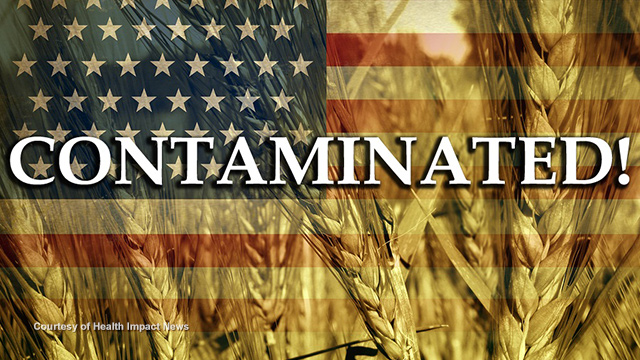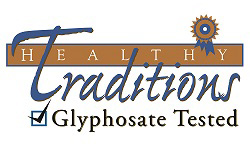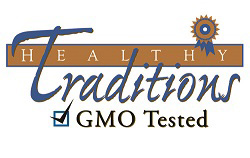The Glyphosate Contamination of Organic Food: An Update
Thursday, December 04, 2014 by: Natural News Editors
Tags: glyphosate contamination, organic food, pesticide residue

- Dandelion root extract found to kill leukemia cells, prostate cancer cells and chemo-resistant melanoma
- Vaccine horrors: Medical mutilation of innocent children exposed in GRAPHIC photos of "safe" vaccines gone horribly wrong
- The REAL FAKE NEWS exposed: '97% of scientists agree on climate change' is an engineered hoax... here's what the media never told you
- Dandelion root far more effective in fighting cancer cells than chemotherapy
- The MMR vaccine, autism connection
- Forget Filling Cavities: Regrow Your Teeth Instead
- Thermonuclear missile launch near Los Angeles is final sign of World War III on the precipice... US, China and Russia all escalating covert attacks in run up to global war
- The best and worst forms of magnesium to take as a supplement
- Magnesium - The Weight Loss Cure
- Vitamin C mega-dosing continues to unleash healing miracles around the world
- Vaccine fraud exposed: Measles and mumps making a huge comeback because vaccines are designed to fail, say Merck virologists
- Treat non-alcoholic fatty liver disease naturally
- Avoid vaccines and use these top four natural remedies for flu prevention instead
- A Holistic Approach to Treating the Symptoms of Diverticulitis
- Study: 97 percent of children affected by 2009 mumps outbreak were vaccinated for condition
- Myth Busted: Hitler Was Not a Vegetarian
- Beat cancer with 35% hydrogen peroxide
- FDA admits not knowing about existence of many food chemicals, let alone their safety
- Cannabis kicks Lyme disease to the curb
- The REAL FAKE NEWS exposed: '97% of scientists agree on climate change' is an engineered hoax... here's what the media never told you
- Clear heart blockages with this powerful lemon and garlic mixture
- Ginger over chemo: This powerful root can eliminate 10,000x the number of cancer cells
- Vaccine horrors: Medical mutilation of innocent children exposed in GRAPHIC photos of "safe" vaccines gone horribly wrong
- Avoid vaccines and use these top four natural remedies for flu prevention instead
- Vaccine fraud exposed: Measles and mumps making a huge comeback because vaccines are designed to fail, say Merck virologists
- Beat cancer with 35% hydrogen peroxide
- Dandelion root far more effective in fighting cancer cells than chemotherapy
- Forget Filling Cavities: Regrow Your Teeth Instead
- Flu shot hoax admitted: "No controlled trials demonstrating a decrease in influenza"
- The United Nations 2030 Agenda decoded: It's a blueprint for the global enslavement of humanity under the boot of corporate masters
- The best and worst forms of magnesium to take as a supplement
- Suppressed science: Garlic proven to kill brain cancer cells without side effects
- Breast Cancer Fund exposes the cancer-causing chemicals lurking in food
- Before his death, father of ADHD admitted it was a fictitious disease
- Vaccine industry in panic over global effort to remove all mercury from vaccines
- Severe childhood allergies to peanuts, eggs and dairy directly linked to 'trace' ingredients in common vaccines
- The REAL FAKE NEWS exposed: '97% of scientists agree on climate change' is an engineered hoax... here's what the media never told you
- Beat cancer with 35% hydrogen peroxide
- Supplements to detox the body from vaccinations
- Vaccine fraud exposed: Measles and mumps making a huge comeback because vaccines are designed to fail, say Merck virologists
- Cannabis kicks Lyme disease to the curb
- Forget Filling Cavities: Regrow Your Teeth Instead
- The best and worst forms of magnesium to take as a supplement
- The United Nations 2030 Agenda decoded: It's a blueprint for the global enslavement of humanity under the boot of corporate masters
- Clear heart blockages with this powerful lemon and garlic mixture
- What's really in vaccines? Proof of MSG, formaldehyde, aluminum and mercury
- Measles vaccine far more dangerous than measles itself
- Dandelion root far more effective in fighting cancer cells than chemotherapy
- Ginger over chemo: This powerful root can eliminate 10,000x the number of cancer cells
- Six little-known natural remedies for tinnitus
- Apricot Seeds Kill Cancer Cells without Side Effects
- Aajonus Vonderplanitz PhD, key informant in prosecution of Sharon Palmer and James Stewart, found to have faked academic credentials
- Schizophrenia Not Caused by Genes, Scientist Says
- Vaccine horrors: Medical mutilation of innocent children exposed in GRAPHIC photos of "safe" vaccines gone horribly wrong
- Newly released JFK files reveal Pentagon's role in creating Lyme disease and covid in the same lab
- Eleven days before Iran bombed Tel Aviv, my microscope revealed haunting images of EXACTLY what would happen
- Morphic resonance “remote viewing” reveals iconic Middle East images of stealth bombers, a falcon and a one-horned ram
- DECENTRALIZED SPIRITUALITY and the true teachings of Christ: Overcoming the censorship, threats and lies of organized religion to truly know God and the Universal Christ
- HEALTH SECRETS: How to Instantly Block MSG Toxicity Using Natural Substances (and the secret of Methylene Blue)
- Mike Adams releases country western hit single: Goin’ Back in Time is Comin’ Home
- The Health Ranger releases “Vaccine Zombie” song and music video, using AI-animated zombies for the music video
- BOMBSHELL: Internal Pfizer documents exposed and reveal at least 16 PERCENT of their mRNA vaccine "adverse events" are REPRODUCTIVE DISORDERS
- Amazing microscopy photos reveal how freezing crystals attempt to mimic electronic structures they are touching
- The Coming Gold Revaluation: Strategic Financial Realignment in an Era of Dollar Collapse
- The AI Data Center Wars Have Begun… Farms, Water and Electricity is Stripped from Humans to Power the Machines
- Urgent Wake-Up Call: The Coming AI Robot Wars and the Great Human Unity
- EPA advisor admits the agency is funneling billions to climate groups ahead of Trump’s return to White House
- The War on Light: How Governments and Big Pharma Keep You Sick By Blocking Healing Photons
- Aerosolized bioweapons? Strange “diploid biomasses” falling out of the sky in Florida captured under the microscope
- BOMBSHELL: DNA testing kits are a SCAM to develop ethnic-specific bioweapons
- THE AI RACE IS ALREADY WON: How China’s power dominance (and America’s climate lunacy surrender) secured its victory in the race to AI superintelligence
- Why the U.S. Government May be Seeking to Slaughter 200 Million Americans to Free Up Excess Power for AI Data Centers and the Race to Superintelligence
Health Impact News recently announced[1] the result of an investigation by Tropical Traditions that revealed that many products in the organic grain market in the U.S. contain glyphosate residue at levels almost the same as conventional grains. Read the report here.[1]
In an effort to provide clean food free from glyphosate and GMO contamination, Tropical Traditions continues to test USDA certified organic products to determine which products may be contaminated.
USDA Organic Standards Allow for Residue of Pesticides
It should be noted that this is not a controlled scientific study, but simply an effort by Tropical Traditions to test products supplied to them for the purpose of protecting their consumers from foods contaminated by GMOs or glyphosate. Current USDA NOP standards allow for small amounts of pesticide residue, so companies selling USDA organic products with these allowable limits of GMOs or pesticides are not usually breaking any laws. The organic standards for pesticide residue can be found here[2].
- The EPA establishes the maximum allowed levels of pesticides, or EPA tolerances, which may be present on foods. Although most EPA -registered pesticides are prohibited in organic production, there can be inadvertent or indirect contact from neighboring conventional farms or shared handling facilities. As long as the operator hasn't directly applied prohibited pesticides and has documented efforts to minimize exposure to them, the USDA organic regulations allow for residues of prohibited pesticides at or below 5 percent of the EPA tolerance.
Therefore, the following test results produced by Tropical Traditions does not constitute a general statement regarding any particular product or its level of glyphosate residue. It is meant to make the public and organic producers aware of the issues and promote further research, as well as promote self-testing of their own products.
What was Tested and the Results
In addition to the organic grains that were tested in the last report[1], Tropical Traditions tested the following products:
- Organic Cane Sugar from South America
- Organic Flax Seeds from the Northwest (Dakotas/Montana region)
- Organic Almonds from California
- Organic Almonds imported from Europe
- Several Freeze Dried Fruits from the U.S. and South America
While GMO varieties exist for sugar beets, grown primarily in South America, there are currently no GMO varieties of sugar cane, allowing it to be certified as USDA organic. Tropical Traditions tested one of the largest suppliers of organic cane sugar from South America and found it to be free from any glyphosate. Please note that there are many sources of organic cane sugar, and there is no guarantee that all of them are free from glyphosate.
Tropical Traditions next tested two different sources of organic almonds, one from California and one from Europe. Surprisingly, the California almonds tested negative for glyphosate, while the European almonds tested positive for glyphosate residue. There are, however, many sources of organic almonds in California, and only one source was tested. There are other sustainable issues associated with almonds grown in California. (See: source [3])
Next, Tropical Traditions tested several varieties of freeze dried fruits[4] grown in the U.S. and South America, and they all tested to be free of glyphosate contamination. The freeze dried blueberries[5] tested were from Oregon.
Tests of organic flax seeds from the northwest showed contamination of .06mg/kg of glyphosate, higher than most of the wheat we had tested, and similar to levels seen for organic barely.

Encourage Producers to Test for Glyphosate!
Tropical Traditions is still in the early stages of investigating the contamination of America's food sources. They have identified a couple of wheat sources that have tested free of glyphosate contamination: one in Wisconsin[6] and one in the southern region of the U.S. Tropical Traditions is encouraging organic grain mills across the U.S. to test for glyphosate, and link the tests to specific producers and specific batches. Producers who go the extra mile to ensure their products are free from GMO and glyphosate contamination are encouraged to contact Tropical Traditions and to be added to a directory of health conscious producers on their new Healthy Traditions network[7] which is being developed.



Tropical Traditions and the Healthy Traditions network[7] will be working hard, together with health-conscious producers and suppliers, to provide nutritious uncontaminated food as an alternative to commodity food that is mass produced.
Read more at HealthImpactNews.com.
Sources:
[1] http://healthimpactnews.com
[2] http://www.ams.usda.gov[PDF]
[3] http://healthimpactnews.com
[4] http://www.tropicaltraditions.com
[5] http://www.tropicaltraditions.com
[6] http://www.tropicaltraditions.com
[7] http://healthytraditions.com
Glyphosate contamination at FETCH.news
Get independent news alerts on natural cures, food lab tests, cannabis medicine, science, robotics, drones, privacy and more.
More news on glyphosate contamination
Take Action: Support Natural News by linking to this article from your website
Permalink to this article:
Embed article link: (copy HTML code below):
Reprinting this article:
Non-commercial use OK, cite NaturalNews.com with clickable link.
Follow Natural News on Facebook, Twitter, Google Plus, and Pinterest
Science News & Studies
Medicine News and Information
Food News & Studies
Health News & Studies
Herbs News & Information
Pollution News & Studies
Cancer News & Studies
Climate News & Studies
Survival News & Information
Gear News & Information
News covering technology, stocks, hackers, and more



"Big Tech and mainstream media are constantly trying to silence the independent voices that dare to bring you the truth about toxic food ingredients, dangerous medications and the failed, fraudulent science of the profit-driven medical establishment.
Email is one of the best ways to make sure you stay informed, without the censorship of the tech giants (Google, Apple, Facebook, Twitter, YouTube, etc.). Stay informed and you'll even likely learn information that may help save your own life."
–The Health Ranger, Mike Adams























